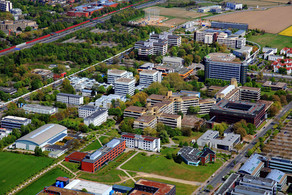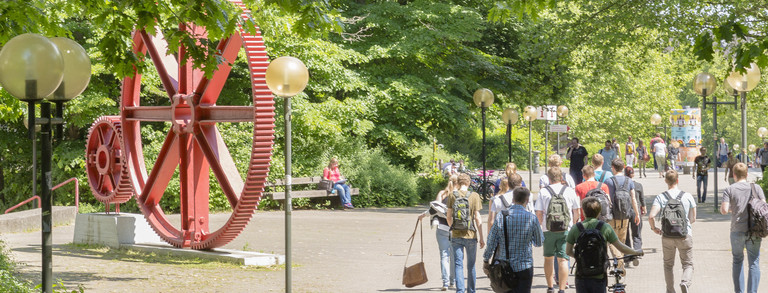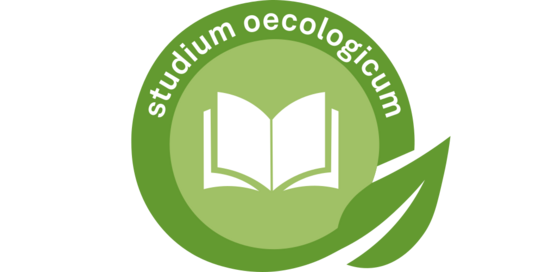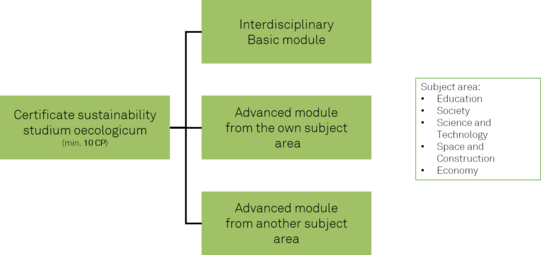Implementation of ESD
ESD is the abbreviation for Education for Sustainable Development. It refers to education that enables people to think and act in a sustainable way. It enables each individual to understand the impact of their own actions on the world.
Federal Ministry of Education and Research, retrieved 26 January 2024. (Translation by the author)
In 2015, the United Nations defined ESD as an independent field of action for the first time with sub-goal 4.7 of the Sustainable Development Goals. By 2030, the aim is to ensure "that all learners acquire the knowledge and skills necessary for sustainable development, including through education for sustainable development" (retrieved 26 January 2024, translation by the author, source text can be found here Federal Ministry of Education and Research). For higher education, ESD means "understanding sustainability in all its facets and recognizing and assessing the challenges of sustainable development in order to be able to act responsibly and in a future-oriented manner in one's living and working environment." (translation by the author, source text can be found here DG HochN guidelines, p. 19, English version not identical to the German version) This opens up new perspectives on research topics in the disciplines and provides impetus for the methodological development of teaching (cf. DG HochN guidelines, p. 19, English version not identical with the German version).
Universities have a special responsibility to support education for sustainable development and research on topics relevant to the future, as they train experts who are important multipliers in society. "If education for sustainable development can be successfully taught as a cross-cutting topic in teaching, it can be a powerful lever for social change", retrieved 26 January 26 2024, translation by the author, source text can be found here Federal Ministry of Education and Research).
The 17 departments at TU Dortmund University offer around 80 Bachelor's and Master's degree programs in the natural sciences, engineering, social sciences and cultural studies. Some of these degree programs deal explicitly with sustainability issues. For example, there are courses on sustainable spatial development, resource-efficient construction, energy efficiency, electric mobility and participation, inclusion and diversity. A total of 7,848 courses took place in Winter semester 2021/22 and Summer semester 2022. Of these, 242 courses dealt explicitly with sustainability or sustainable development. This means that the proportion of courses on sustainability topics at TU Dortmund University was approx. 3%.
*The total number of courses was determined in LSF in the "Students" role according to course type and semester. Certain course types such as "exams" or "school internship" were not counted. The following were counted as sustainable courses:
1. All courses from the studium oecologicum in WiSe 21/22 (31) and SoSe 22 (35) [For the graph, the courses were shown by area and therefore counted twice in some cases: WiSe 21/22: (33) and SoSe 22 (40), see graph below].
2. Courses in LSF were searched for keywords: WiSe 21/22 (95) and SoSe 22 (81) (Courses from the studium oecologicum modules have already been deducted. For a list of keywords, see the chapter Reporting Architecture).
Sustainability certificate studium oecologicum
With the studium oecologicum, a sustainability certificate has also been offered at TU Dortmund University since the Winter semester 2021/22, which students of all disciplines can obtain in addition to their degree certificate. For this, they must take at least three modules with a total of 10 credit points from the "Sustainability module catalog at TU Dortmund University" (in German).
The modules offered are divided into five subject areas: education, society, science and technology, economics and space and construction. The certificate consists of an interdisciplinary basic module, a specialization module from the student's own subject area and a specialization module from a different subject area. This provides the opportunity to take an intra-, inter- and transdisciplinary approach to the topic of sustainability.
The public lecture series Climate: Change, Values, Science is offered every winter semester as an interdisciplinary basic module of the studium oecologicum. The lecture was originally initiated by the Department of Biochemical and Chemical Engineering. It features contributions from internal and external (international) researchers from various departments and is open to the general public. Every summer semester there is a varying interdisciplinary basic module from the Department of Humanities and Theology. The studium oecologicum can currently only be completed in German. A certificate offering in English is in preparation.
In addition, a regular cross-university exchange takes place between the coordinators of the sustainability certificates at Ruhr University Bochum, the University of Duisburg-Essen and TU Dortmund University as part of the University Alliance Ruhr (UA Ruhr). Through this cross-location exchange, the certificates benefit from each other by opening up events for students on the one hand and by jointly generating ideas for the further development of the certificates on the other.
Two pie charts are shown. Each chart displays the number of courses offered as part of the Studium Oecologicum program. These courses are divided into six areas: Foundations, Economics, Education, Society, Spatial Planning & Construction, and Natural Sciences & Technology.
In the 2021/2022 winter semester, there were a total of 33 courses. These were distributed as follows:
- 1 Foundations module
- 2 in the area of Education
- 4 in the area of Society
- 12 in the area of Spatial Planning & Construction
- 14 in the area of Natural Sciences & Technology
In the 2022 summer semester, there were a total of 40 courses. These were distributed as follows:
- 1 Foundations module
- 4 in the area of Economics
- 5 in the area of Education
- 10 in the area of Society
- 11 in the area of Spatial Planning & Construction
- 9 in the area of Natural Sciences & Technology
Teacher training
Teacher training at TU Dortmund University plays an important role in the implementation of ESD in the sense of training social multipliers. TU Dortmund University is one of the largest teacher training locations in North Rhine-Westphalia and offers a wide range of courses. The Dortmund Competence Center for Teacher Education & Research (DoKoLL) (in German) has already implemented ESD in some of the preliminary and accompanying seminars of the practical semester and ESD is also already a topic in individual courses. The aim is to implement ESD across the board in the teacher training subjects.
Simulation game
TU Dortmund University has acquired a campus license for the simulation game sustain2030 to provide an initial introduction to the topic and a low-threshold implementation of ESD in various existing teaching formats. In the simulation game, participants learn about the interdependencies between the 17 Sustainable Development Goals (SDGs) and gain an insight into complex decision-making systems in a fun way. The simulation game is made available to all lecturers at TU Dortmund University after an introduction by the Sustainability Office. It is also available in English for international events.
The cause-effect relationships are shown in the following list:
- SDG 1: SDG 3, 4, 10
- SDG 2: SDG 3, 6, 8, 13, 15
- SDG 3: SDG 3, 8, 10
- SDG 4: SDG 2, 9, 10, 12, 16
- SDG 5: SDG 1, 8, 9
- SDG 6: SDG 3, 14, 15
- SDG 7: SDG 11, 12, 13
- SDG 8: SDG 1, 3, 17
- SDG 9: SDG 2, 3, 7, 8, 12
- SDG 10: SDG 4, 10,16
- SDG 11: SDG 3, 4, 6, 10, 13
- SDG 12: SDG 6, 8, 9, 13, 15
- SDG 13: SDG 11, 13, 14, 15
- SDG 14: SDG 11, 14, 15
- SDG 15: SDG 6, 13, 15
- SDG 16: SDG 3, 17
- SDG 17: SDG 7, 10, 13, 16






